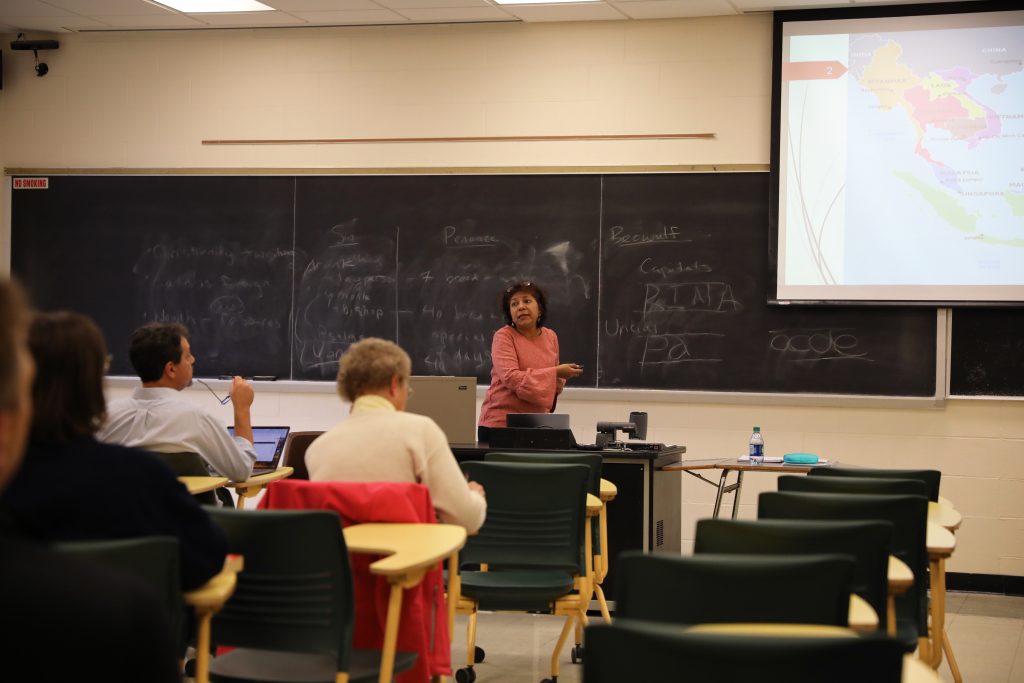A public talk on Thursday given by the Institute for Genocide and Mass Atrocity Prevention (I-GMAP) practitioner-in-residence, Braema Mathi, highlighted issues pertaining to the effects of imperialism in Southeast Asia.
The talk, held in the Fine Arts Building, was titled “The Landscape of Human Rights in Southeast Asia” and covered issues such as colonization and decolonization, human rights violations, regional mechanisms and recommendations for the future of human rights. Mathi also examined regional mechanisms and the progress taking place in the future of the Association of Southeast Asian Nations (ASEAN).
I-GMAP brings in practitioners-in-residence for weeklong stays which focus on strengthening collaboration efforts with the campus community through classroom visits and public talks, according to their official website. Max Pensky, co-director of I-GMAP and a professor of philosophy at BU, said Mathi’s visit was a unique experience compared to their other residencies.
“In the case of Braema Mathi, we never had anybody from Southeast Asia before so we were interested in finding a human rights activist from that part of the world,” Pensky said. “She came across our radar because we now have a big global network of partners.”
Mathi’s career history includes experience in teaching, journalism, research and program coordinating in the field of gender studies. Mathi is currently working as a consultant after having served in notable positions in Singapore, including as a nominated member of Parliament. Pensky said Mathi’s experience was a major factor in why she was chosen for the practitioner-in-residence program.
“She seemed like someone who had done many different things and played so many different roles in government, education, journalism, NGOs and civil society,” Pensky said.
In her talk, Mathi said she became involved with I-GMAP’s practitioners-in-residence program after seeing Pensky’s ability to see the larger idea in human rights atrocities.
“I was invited to come to Binghamton University by Max Pensky, who wrote to me,” Mathi said. “I liked the way he viewed the bigger picture of this issue of atrocity, not just by the incident because atrocity happens because of a confluence of factors.”
One student in attendance, Collin Wildridge, a second-year graduate student studying public administration, said he attended the talk to supplement his studies.
“My focus in public administration is genocide and mass atrocity prevention, so it is a part of my studies,” Wildridge said. “I also heard Braema Mathi talk in my class this week, and I had a chance to talk with her outside of class as well.”
Wildridge said the topic is especially relevant in today’s society with international politics.
“It is a very interesting topic,” Wildridge said. “Southeast Asia is an emerging economy and player in world politics. It’s also an area of concern, just like most of the world, due to populism that has been developing. I think it’s good to know at least some of the overview of what’s going on in the world.”
Mathi said prevention work is crucial to stopping cases of human rights violations in Southeast Asia.
“If you want to prevent it, we must bring in many actors so that we can look at it and form a collaborative model,” Mathi said.
She also noted she was excited to see students’ interest in atrocity prevention during her time as a practitioner-in-residence at BU.
“The students are so interested and they are asking good questions and doing readings, but they are thinking, which is the most important thing,” Mathi said. “I have been very well looked after by the whole department, so I am enjoying myself.”



